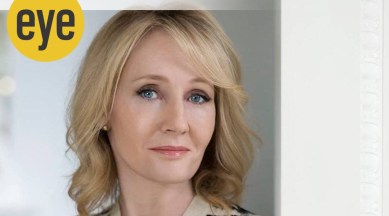📣 For more lifestyle news, click here to join our WhatsApp Channel and also follow us on Instagram
The Witch Trials of JK Rowling and why it is courting controversy for the Harry Potter writer’s views on trans identity — again
A new podcast that was launched on February 21 has Rowling explaining her views on trans rights

February 21 saw the launch of a new podcast, the provocatively named The Witch Trials of JK Rowling, in which the writer of the enormously popular Harry Potter series spoke of her views on transgender rights and why they have been “profoundly misunderstood”.
“What has interested me in recent years, particularly on social media,” says Rowling in the trailer of the podcast, “is when fans say, ‘You’ve ruined your legacy. Oh, you could have been beloved forever, but you chose to say this.’ And I think: ‘You could not have misunderstood me more profoundly.’” Rowling was referring to the controversy that surfaced three years ago when a series of her tweets on trans rights were condemned by activists and colleagues for being transphobic.
monthly limit of free stories.
with an Express account.
What’s the podcast about and who is making it?
The podcast, The Witch Trials of JK Rowling, is being produced by The Free Press, a media company founded by a former New York Times journalist who resigned in 2020 citing a hostile work environment. NYT recently received two open letters from staff writers and a queer rights advocacy group criticising its “anti-trans” coverage, following which the newspaper published an opinion piece defending JK Rowling.
The podcast is being hosted by Megan Phelps-Roper, the granddaughter of Fred Phelps, who founded the Westboro Baptist Church, an organisation widely known in the United States for its overtly racist, homophobic and transphobic propaganda.
In 2012, Phelps-Roper claimed to reform her views and, according to the podcast’s announcement, has since “used her experiences to work with schools on anti-bullying campaigns, with law enforcement organisations investigating deradicalisation, and with tech companies on the intersection of safety, free speech, and the value of dialogue across ideological divides.”
Who is criticising it?
Soon after the announcement, popular YouTuber and trans woman Natalie Wynn, who has previously been critical of Rowling’s views, tweeted that she consented to be a part of the podcast a year ago on the condition that Phelps-Roper does not “frame the conflict as a debate between two equally legitimate sides.”
“But it’s now clear that this is exactly what she’s done,” she added, saying she regrets her participation. “Her stance seems to be that trans people and transphobes are equally dogmatic & combative; that if we could all just have a calm, civil conversation, empathy would prevail.”
What has JK Rowling said about trans people exactly?
In 2020, Rowling retweeted an article on “people who menstruate,” criticising that it did not say “women” instead. She went on to tweet, “If sex isn’t real, there’s no same-sex attraction. If sex isn’t real, the lived reality of women globally is erased. I know and love trans people, but erasing the concept of sex removes the ability of many to meaningfully discuss their lives. It isn’t hate to speak the truth.”
She added, “The idea that women like me, who’ve been empathetic to trans people for decades, feeling kinship because they’re vulnerable in the same way as women — ie., to male violence — ‘hate’ trans people because they think sex is real and has lived consequences — is a nonsense.”
What was the backlash?
Soon, she published an essay in which she elaborated on her reasons for speaking out on the issue, which was criticised by activists. Harry Potter star Daniel Radcliffe penned an open letter in which he said “78 per cent of transgender and non-binary youth reported being the subject of discrimination due to their gender identity. It’s clear that we need to do more to support transgender and non-binary people.”
His co-stars in the franchise Emma Watson and Rupert Grint also came out in support of the community, with Watson saying “Trans people are who they say they are and deserve to live their lives without being constantly questioned or told they aren’t who they say they are.”
Eddie Redmayne, who starred as Newt Scamander in the Fantastic Beasts and Where to Find Them series, also released a statement saying, “Trans women are women, trans men are men, and non-binary identities are valid. I would never want to speak on behalf of the community but I do know that my dear transgender friends and colleagues are tired of this constant questioning of their identities, which all too often results in violence and abuse.”
📣 For more lifestyle news, click here to join our WhatsApp Channel and also follow us on Instagram